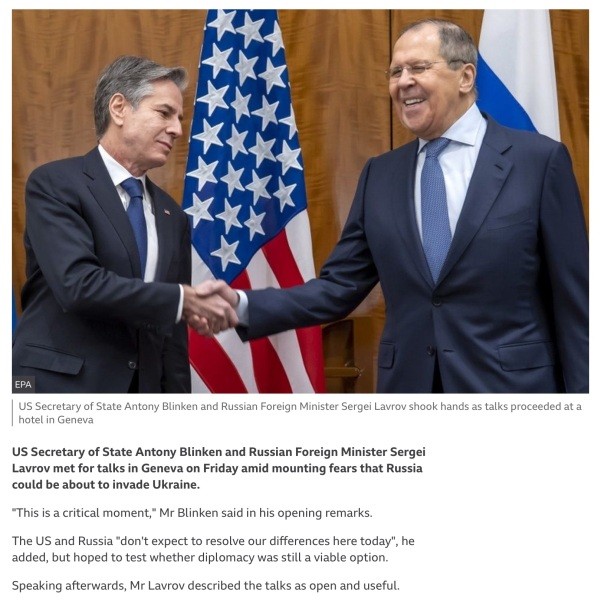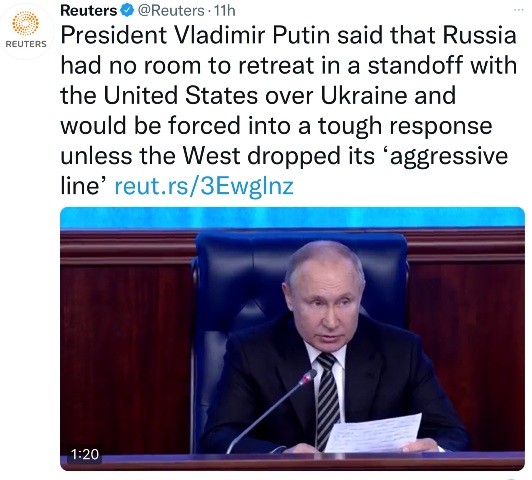With realpolitik in mind, Strategic Demands has proposed a ‘fix’ to the Ukraine crisis, a confrontation that publicly seems to be without resolution. We believe security is at the center of the dispute. We propose a mutual security that goes to a core threat of nuclear weapons and the need now for an expanded INF agreement
Surviving Victory

StrategicDemands: Extend and Expand the Intermediate-Range Nuclear Forces Treaty
* https://www.armscontrol.org/factsheets/INFtreaty
Update / February 28
Washington Post | Opinion: Putin’s nuclear threats remind us arms control is dangerously unfinished business
Lost opportunity for nuclear arms control agreements and ‘mutual security’
Update / February 2
In a story released early today by elpais.com, presented as an “exclusive”, we are offered an inside look at U.S. – Russia Ukrainian negotiations… We now have to point to Strategic Demands earlier proffered diplomatic solution — to focus on mutual security as our StratDem logo tag states “Security is Indivisible”. Perchance mutual security has found resonance.
In paragraph 4 of the elpais.com ‘exclusive’ article a reference is made to the Organization for Security and Co-operation in Europe (OSCE) and goes on to say “Washington is prepared to discuss the concept of ‘indivisibility of security'”.
* https://english.elpais.com/usa/2022-02-02/us-offers-disarmament-measures-to-russia-in-exchange-for-a-deescalation-of-military-threat-in-ukraine.html
The main difference between both texts is that Washington is prepared to discuss the concept of “indivisibility of security,” which the OSCE approved at its summit in Nur-Sultan, Kazakhstan in 2010. Moscow has included this in the first article in its draft deal, using this principle to allege that the eventual entry of Ukraine into NATO would affect its security. The text from the US warns that it does not share the Russian point of view and notes that the concept of indivisibility of security “cannot be viewed in isolation.” Even so, it expresses willingness to deal with the “respective interpretations” of the same. And it points out that “the United States and Russia also reaffirmed the inherent right of each and every participating state to be free to choose or change its security arrangements, including treaties of alliance.”
Later in the day, U.S. spokesperson John Kirby referred to the negotiation documents written about by elpais.com and stated the U.S. willingness to negotiate with Russia. Mutual security, ‘security is indivisible’ as a principal is on the table and in negotiation!
* https://english.elpais.com/usa/2022-02-02/pentagon-says-documents-published-by-el-pais-show-us-is-willing-to-negotiate-with-russia.html
Pentagon spokesman John F. Kirby said on Wednesday that the confidential documents published exclusively by EL PAÍS – and which included the responses by Washington and NATO to Russia’s requests for security guarantees – show that the United States has the willingness to negotiate with the Kremlin in order to solve the crisis in Ukraine.
Kirby mentioned the documents in his opening remarks ahead of a news conference at the Department of Defense. “We did not make this document public, but now that it is, it confirms to the entire world what we’ve always been saying: there is no daylight between our public statements and our private discussions.”
StratDem continues to advocate for solutions that move nations toward mutual security and nuclear nonproliferation. This confrontation at the border of Ukraine provides in its charges of insecurity and claims of aggression comes an opportunity to move toward broad-range solutions that address nuclear and potentially cataclysmic challenges.
Amid the rattling of swords and ‘modernization’ of nuclear forces, the forward positioning of ground- and air-based tactical and nuclear weapons, comes a generational opportunity to drawdown and step back from mutual nuclear insecurity.
* https://strategicdemands.com/a-proposed-ukraine-fix-act-now-to-expand-the-inf-agreement/
Update / February 1, 2022
Russian President Vladimir Putin, speaking at a Tuesday news conference following a five-hour meeting in Moscow with Hungarian Prime Minister Viktor Orban:
“It is already clear — I informed the Prime Minister about this — that the fundamental Russian concerns were ignored [in the U.S. response]. We did not see an adequate consideration of our three key requirements.” Russia had not seen, he explained, “adequate consideration of our three key demands regarding NATO expansion, the renunciation of the deployment of strike weapons systems near Russian borders, and the return of the [NATO] bloc’s military infrastructure in Europe to the state of 1997, when the Russia-NATO founding act was signed.”

A Proposal for Joe Biden & Vladimir Putin
Strategic Demands to Presidents Joe Biden and Vladimir Putin: Step back from the brink
Order your ambassadors to focus on achieving ‘mutual security’

Address the nuclear weapons, tactical and strategic, extension of the INF treaty, expansion of NATO, nuclear weapons ‘modernization’ attached to enhanced nuclear weapons controls. Real, mutually verifiable security.
War involving nuclear-armed states will never bring real security…
∞
Intermediate-Range Missiles Are a Focal Point in the Ukraine Crisis: The Stalled INF Negotiation Can Provide the ‘Fix’ to the Ukraine Crisis
Nuclear Weapons in Europe … Tactical/Strategic Background
Security Perspectives, Security Demands: Russia, Ukraine, NATO, US, European nations
If one steps back and takes a broader look at the causes of potential war over the issue of Ukraine, the issue takes on a larger security perspective, i.e., nuclear weapons “modernization” and next generation “smart”, “dial-up” tactical nuclear weapons imminently being deployed in Europe and other theaters.
The modernization of nuclear weapons post Cold War nuclear triad strategies, and the Mutually Assured Destruction (MAD) era of massive nuclear retaliation with ‘launch on warning’ command and control to assure land-based missile capabilities can respond to perceived preemptive attack, has led to a new era, one of so-called small nukes.
They are not small, they are profoundly dangerous to real security. The current European, East-West standoff with Russia over Ukraine, NATO expansion and next gen nuclear weapon delivery systems and capabilities demonstrate how the coming nuclear weapons are bringing on new iterations of nuclear danger.
A realistic, mutual security approach to the INF agreement, elevated to immediate highest priority, can become the necessary security fix to step back from a war in Ukraine.
Mutual security is the goal to be achieved.
Security here is indivisible.

∞
Notes:
“Examining the United States and Russia’s differing responses to the demise of the Intermediate-Range Nuclear Forces Treaty highlights the interconnectedness of these events and the failure of the nations to communicate. While Russia’s threats are fundamentally tied to maintaining influence over Ukraine and deterring NATO expansion, a renewed focus on arms control can still play a role in finding a peaceful resolution.”
Why Intermediate-Range Missiles Are a Focal Point in the Ukraine Crisis
”Russia’s proposal for ending the current crisis stipulates that the United States “not deploy land-based intermediate- and short-range missiles in areas allowing them to reach [Russian territory].”
https://mid.ru/ru/foreign_policy/rso/nato/1790803/
https://mid.ru/ru/foreign_policy/rso/nato/1790803/?lang=en




